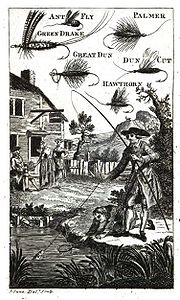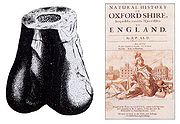
Richard Brookes
Encyclopedia
Richard Brookes was an English physician and author of compilations and translations on medicine, surgery, natural history, and geography, most of which went through several editions.
(Dedication of Art of Angling). At some time previous to 1762 he had travelled both in America and Africa (Preface to Natural History).


His main translations are The Natural History of Chocolate (1724), from the French Histoire Naturelle du Cacao et du Sucre (1719) of Quelus (de Chélus), 2nd ed. 1730; and Jean-Baptiste Du Halde
's History of China, 4 vols. 1736.
Life
He was at one time a rural practitioner in SurreySurrey
Surrey is a county in the South East of England and is one of the Home Counties. The county borders Greater London, Kent, East Sussex, West Sussex, Hampshire and Berkshire. The historic county town is Guildford. Surrey County Council sits at Kingston upon Thames, although this has been part of...
(Dedication of Art of Angling). At some time previous to 1762 he had travelled both in America and Africa (Preface to Natural History).
Works
His General Gazetteer (1762) filled a gap in the market and went through many editions, up to that of A. G. Findlay in the later nineteenth century. Other works were:
- History of the most remarkable Pestilential Distempers, 1721.
- The Art of Angling, Rock and Sea Fishing, with the Natural History of River, Pond, and Sea Fish, 1740.
- The General Practice of Physic, 1751.
- An Introduction to Physic and Surgery, 2 vols. 1754.

- A System of Natural History, 6 vols. 1763. Includes Volume 5, known in the early history of palaeontology. In this volume Brookes noted a bone, known previously to Robert PlotRobert PlotRobert Plot was an English naturalist, first Professor of Chemistry at the University of Oxford, and the first keeper of the Ashmolean Museum....
, and now identified as coming from MegalosaurusMegalosaurusMegalosaurus is a genus of large meat-eating theropod dinosaurs of the Middle Jurassic period of Europe...
; found in a quarry at Cornwell, OxfordshireCornwell, OxfordshireCornwell is a village and civil parish about west of Chipping Norton in West Oxfordshire.-History:The Church of England parish church of Saint Peter was originally Norman, and the chancel arch survives form this time. Most of the windows are Decorated Gothic and Perpendicular Gothic additions. The...
, it is known as the "Cornwell bone". Brookes named the creature from which it came Scrotum Humanum in 1763, referring to anatomical similarities with the human scrotumScrotumIn some male mammals the scrotum is a dual-chambered protuberance of skin and muscle containing the testicles and divided by a septum. It is an extension of the perineum, and is located between the penis and anus. In humans and some other mammals, the base of the scrotum becomes covered with curly...
.
His main translations are The Natural History of Chocolate (1724), from the French Histoire Naturelle du Cacao et du Sucre (1719) of Quelus (de Chélus), 2nd ed. 1730; and Jean-Baptiste Du Halde
Jean-Baptiste Du Halde
Jean-Baptiste Du Halde was a French Jesuit historian specializing in China. Although he had not gone to China, he collected seventeen Jesuit missionaries' reports and provided encyclopedic survey on Chinese history, culture and society....
's History of China, 4 vols. 1736.

